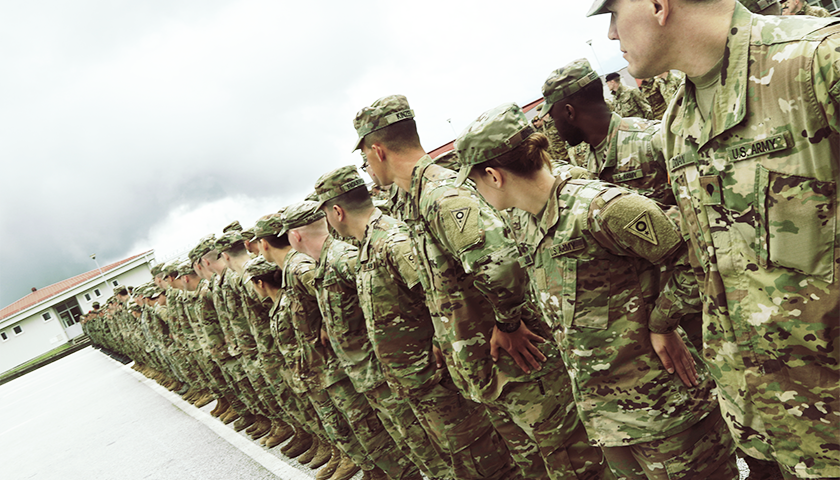by Mackubin Owens
For many years, the U.S. military has been among the most trusted of American institutions, certainly the most trusted part of the U.S. government. It has maintained that status despite its failure to achieve success in the post-9/11 wars. Americans seem to have accepted the argument that this failure has more to do with the political constraints placed on the military than on the military’s doctrine, planning, and execution. They have continued to accept the military’s self-image as a profession rather than a self-interested bureaucracy, and have supported its professional ethos understood as duty, honor, and sacrifice.
But attitudes toward the military seem to be changing. According to a recent survey conducted by the Ronald Reagan Presidential Foundation and Institute, the number of Americans who express a great deal of confidence and trust in the military has dropped from 70 percent to 45 percent in just the past three years, including an 11 percent drop since February.
Among those who expressed a low degree of confidence in the U.S. military, 13 percent cited “political leadership” as a reason. Although only a plurality, that figure seems to indicate that views of the military have been affected by the toxic political polarization that has afflicted the body politic in recent times.
For instance, the survey indicates that Americans in general are losing confidence in the military. In 2018, 87 percent of Republican respondents said they had a great deal of confidence in the military. In 2021, that number had declined to 53 percent. In 2018, 59 percent of Democratic respondents and 66 percent of independents expressed a great deal of confidence in the military. In 2021, those figures dropped to 42 percent and 38 percent respectively.
The decline in Republican support for the military is especially telling. Even as support for the military bottomed out in the aftermath of the Vietnam War, Republicans and conservatives tended to dismiss attacks on the military as unpatriotic.
So what has changed? One likely answer is the public’s perception that the U.S. military has revealed itself as a self-interested bureaucracy willing to embrace the excesses of the current progressive critique of the United States, forfeiting its reputation as a politically disinterested profession. We see this in the tepid response by flag and general officers to the calumny that “extremism” and “white supremacy” are widespread within the active force and among veterans. We see it in the military’s embrace of identity politics, the new racism. We see it in the blatantly politicized behavior of the chairman of the Joint Chiefs of Staff in the waning days of the Trump Administration. We see it in the lack of accountability in the Afghan debacle.
Citizens wonder why the Pentagon is making “diversity” rather than military effectiveness its primary goal. They may rightly wonder if there might be some connection between the Pentagon’s emphasis on identity politics on the one hand and the lack of military success on the other. Does the Pentagon even care about military success anymore?
What has happened to the U.S. military was foretold by Samuel Huntington in 1957. In his classic study of civil-military relations, The Soldier and the State, Huntington identified three variables affecting the civil-military relationship. He called the first the functional imperative, the ability of the military to respond to external threats to the United States. The military must be capable of deterring war or winning it if it comes. The key here is military effectiveness.
The second and third variables are components of what Huntington called the societal imperative, “the social forces, ideologies, and institutions dominant within the society.” The first of these components is our constitutional structure, the legal institutional framework that guides American politics and military affairs.
The second is the dominant ideology shaping political affairs, which Huntington identified as liberalism, “the gravest domestic threat to American military security,” due to its anti-military character. The problem for Huntington was that in the long run, the societal imperative would prevail over the functional imperative, undermining the military virtues necessary to ensure military effectiveness.
Huntington argued that in practice, America’s anti-military liberal ideology tended to produce two outcomes. When the external threat was low, liberal ideology sought “extirpation,” the virtual elimination of military forces. When the external threat was higher, liberal ideology pursued a policy of “transmutation,” refashioning the military along liberal lines by stripping it of its “particularly military characteristics.”
Transmutation has been at work in the U.S. military at least since the end of World War II but accelerated in the 1980s and 1990s with civilian pressure to open combat roles to women. The latest iteration of the military’s transmutation is the emphasis on “diversity, equity, and inclusion.”
The genesis of this latest example of transmutation was President Obama’s memorandum, “Promoting Diversity and Inclusion in the National Security Workforce,” issued during his last year in office. This order opened the door to today’s problems by placing identity politics, diversity quotas, and political indoctrination—rather than military effectiveness—at the heart of the military’s mission. Instead, “diversity”—maximizing identity politics metrics—emerged as the military’s “greatest asset.”
Obama’s order also mandated what it called “implicit or unconscious bias” training. Those who have examined this training see it for what it is: political indoctrination aimed at normalizing the radical view that the military—like all American institutions—is racist to the core.
The Trump Administration ordered a ban on such training in the military, which Biden rescinded. Meeting racial, gender, and other identity politics quotas has now become the foremost task of senior leadership. Unfortunately, the military’s leadership seems to have embraced the principles underlying identity politics and its claim of systemic racism.
The problem with the military’s embrace of identity politics is threefold. First, it destroys trust and undermines the unit cohesion upon which military effectiveness depends. If some military members are being taught that they are victims and others are oppressors, the result will be the rise of a destructive tribalism. Identity politics encourages distrust among racial groups, which is fatal to unit cohesion.
Secondly, identity politics undermines trust between political and military leaders on the one hand and those they lead on the other. If the rank and file believe that their leaders are willing to sacrifice them on the altar of political correctness, as determined by some human resources “equity” initiative, there will be retention and recruiting consequences. Who wants to serve people who think you are a racist, essentially no different from a neo-Nazi? Of course, there is no place in the U.S. military for KKK members, neo-Nazis, or skinheads, but the services have long been on the lookout for such types who, when identified, have been expeditiously separated from the military.
And finally, identity politics undermines trust between the military as an institution and the public. I believe that the recent decline in the public’s esteem of the military has been directly tied to the latter’s embrace of identity politics. In my writings on civil-military relations, I have noted that the often forgotten party to the civil-military bargain is the citizenry. Ultimately, no national security policy can survive without the support of that public. This recent poll seems to validate that view.
It should be noted that the military has long been a bastion of American diversity, properly understood. It has been far from perfect, but by emphasizing military effectiveness—Huntington’s functional imperative—it has successfully integrated Americans from all walks of life and all races into one of the most cohesive U.S. institutions. It has sought to achieve fairness in assignments and promotions. It has sought to eliminate favoritism by stressing merit.
Despite the claim that racism and white supremacism are rampant within the military, that institution has actually done better than most others when it comes to racial issues. The late military sociologist Charles Moskos observed several decades ago that the U.S. Army was the only institution in America in which black men routinely gave orders to white men. Of course, the Army was not alone. And it should be noted that the services accomplished this not by favoring African Americans over whites, or by focusing on race above all, but by holding all to equal standards. As former secretary of the Navy and U.S. Senator Jim Webb observed, in the military, “fairness is the coin of the realm.”
The United States spends a great deal of money on its military. But public acquiescence in this funding could collapse if people come to believe that the U.S. military is not a profession based on honor and duty, the purpose of which is to ensure the security of the United States, but rather just another self-interested bureaucracy. A lesson from the Reagan Library poll is that the U.S. military is at a crossroads. Its leadership must validate the trust and respect that has been afforded to it by the public, or risk watching that respect evaporate. It must demonstrate that it is an organization committed to success on the battlefield and that it is not a laboratory for identity politics or anything else that does not contribute to military effectiveness.
– – –
Mackubin Owens reports for American Greatness.
Photo “Dress-Right-Dress” by The U.S. Army. CC BY 2.0.









China realizes THIS time, now/next 3 years, is when The USA is under THE weakest president of all time; along with a USA presidential most-kiss-assedness attitude towards China.
For Taiwan, the next three years will be scary. Like… any day, scary.
I believe the reason China keeps flying squadrons into Taiwan airspace, daily, and en masse, is in HOPES that Taiwan will attack one, some day. THEEEENNNNN… China can do all that it wants, and all under the guise of a, “self-defense response”.
Voila, that’s how Taiwan fixes China’s problem.
PS: Don’t.